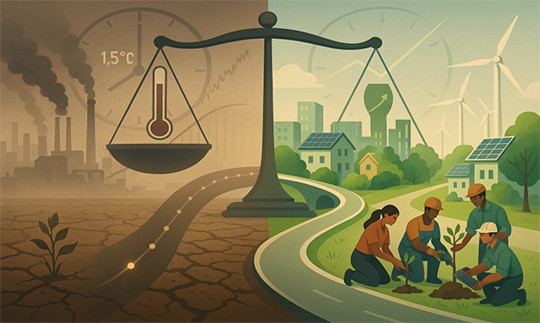Why Decarbonize?
Decarbonization is not just an environmental imperative, but a strategic business opportunity.
The Urgency
Climate change poses a significant threat to global economic stability and environmental sustainability. In India, the impacts are particularly pronounced, with over 80% of the population living in districts highly vulnerable to extreme weather events. India has already experienced a rise in average temperature of 0.7°C from 1901 to 2018, affecting agricultural productivity and health. By 2050, 148.3 million people in India are projected to live in severe climate hotspots. The Government of India has set ambitious targets, aiming for a 50% reduction in emissions intensity by 2030 and net-zero emissions by 2070. However, achieving these goals requires robust policy interventions to mitigate climate risks, which could otherwise lead to a 24.7% loss in GDP by 2070.
The Opportunity
Embracing sustainability offers substantial economic benefits and opportunities for growth. The Government of India aims to expand its renewable energy capacity to 500 GW by 2030, with renewable sources already contributing to 21% of electricity generation in 2023-24. The Ministry of Environment, Forest and Climate Change has been allocated budget, reflecting a commitment to environmental protection. By aligning business strategies with climate goals, India can unlock significant economic opportunities while ensuring sustainable development.
Arantree's Role
Arantree plays a pivotal role in facilitating low-carbon growth pathways that are both financially and operationally viable. By mapping sector-specific emission reduction strategies supported by lifecycle assessments, Arantree helps leverage indigenous clean technologies and circular economy models to achieve cost-effective decarbonization. This approach aligns climate action with financial viability by focusing on ROI-driven strategies, energy savings, and green financing advisory. Furthermore, Arantree guides clients through upcoming policies such as India's Carbon Market Mechanism, Green Credit Program, and Net Zero targets, ensuring compliance and strategic positioning in a rapidly evolving regulatory landscape. In line with India's ambitious goals, such as achieving net-zero emissions by 2070 and reducing emission intensity by 85% by then, Arantree's expertise supports businesses in navigating these transitions effectively while contributing to sustainable development pathways.
"Sustainable development is not just about preserving the environment, it's about ensuring economic viability while doing so. Our commitment is to develop decarbonization roadmaps that make financial sense."
-- Prof Anuradda Ganesh, CEO

Key Benefits of Decarbonization:
- Lower operational costs through energy efficiency and resource optimization.
- Enhanced brand reputation and stakeholder trust in sustainability-driven markets.
- Improved access to ESG-linked financing and green capital markets.
- Compliance readiness for evolving carbon regulations and disclosure norms.
- Competitive advantage in global supply chains prioritizing low-carbon partners.
